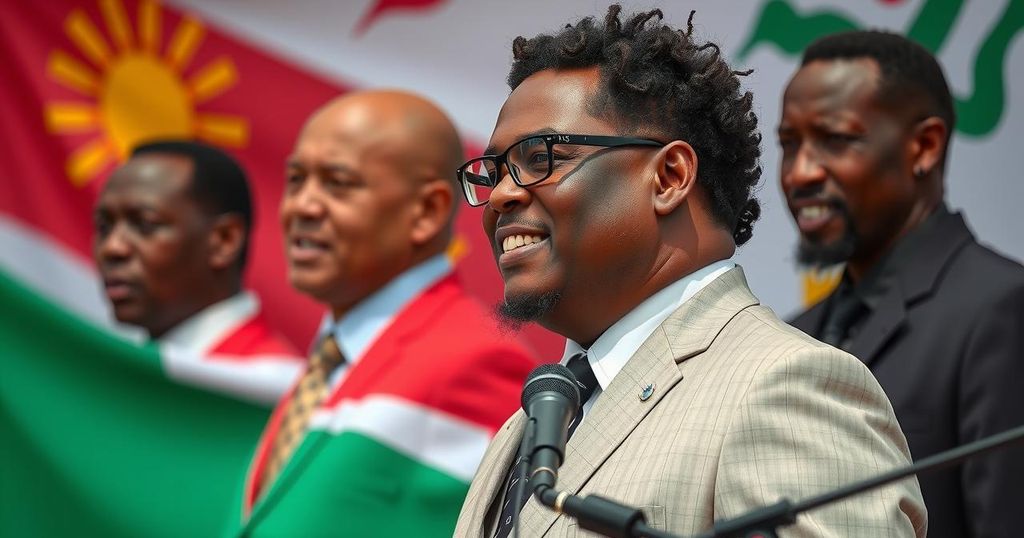Swapo Faces Electoral Setbacks Amidst Growing Voter Discontent in Namibia

Swapo, Namibia’s ruling party, retains power but with a diminished majority in a year of electoral losses for incumbents in sub-Saharan Africa. Voter discontent, driven by economic downturns and corruption, is prompting significant changes, as seen in countries like Botswana and Mauritius. This trend signals a pivotal moment for opposition parties across the region.
Namibia’s governing party, Swapo, has retained its power after over three decades, albeit with a reduced majority, indicating a growing trend of electoral challenges for incumbents across sub-Saharan Africa. Netumbo Nandi-Ndaitwah, the Swapo candidate, secured victory in the presidential election with 57% of the votes, marking her as the country’s first female leader. However, this election was marred by logistical issues and claims of irregularities, leading opposition parties to reject the outcome. Swapo’s decline in the parliamentary elections, where it lost twelve of its sixty-three seats, has raised questions about how it managed to increase its presidential vote share simultaneously.
This year has emerged as a significant turning point for various governments in sub-Saharan Africa, where incumbents faced substantial losses, indicating a wave of change and public discontent fueled by economic difficulties and corruption. This trend has also seen landslide defeats in countries such as Botswana and Mauritius, where historically dominant parties lost control amidst rising public frustration. The similarities in voter sentiment across regions point to a broader movement against perceived governmental ineptitude and corruption.
The case of Botswana is striking; the Botswana Democratic Party (BDP), which ruled since independence, was substantially reduced to just four seats in Parliament. Similarly, the ruling coalition in Mauritius saw a dramatic shift in power, with the opposition coalition winning 60 out of 66 seats. Elsewhere, Senegal witnessed significant political realignment as well, with opposition candidates overcoming pre-election incarceration to secure victory. Even in situations where incumbents maintained power, such as in South Africa and Namibia, their ability to govern was notably weakened, leading to coalition management and significant political adjustments.
These electoral losses across sub-Saharan Africa reflect an increasing public intolerance to corruption, economic hardships, and the rising effectiveness of opposition parties. Growing evidence of public dissatisfaction stemming from higher living costs further eroded governmental credibility. This situation is compounded by heightened global inflation rates, suggesting a widespread sentiment against mismanaged economies. The responses of opposition parties demonstrate strategic learning from previous elections, resulting in united coalitions and enhanced electoral oversight, which proved pivotal in challenging established powers.
As the region anticipates further elections, trends indicate potential ongoing challenges for incumbents, notably in Ghana and Malawi. Should Ghana experience a change in leadership, it would mark a historically notable period, as sub-Saharan Africa faces five opposition victories in 2024, surpassing prior records. This resilience against authoritarianism highlights an evolving political landscape contrasting with global democratic declines.
Engagements by civil society and active citizenry showcase the proactive demands for accountability, portraying a narrative of resilience in multiparty dynamics. The developments in sub-Saharan Africa suggest a burgeoning readiness among voters to reject ineffective governance, emphasizing the need for global observation of this unique political evolution.
Such movements highlight an urgent call for international entities to recognize and support the facets of democratic resilience emerging in this region, often overlooked due to preconceived notions about sub-Saharan Africa’s political climate.
The political landscape in sub-Saharan Africa has been experiencing significant shifts recently, with many ruling parties facing strong challenges from opposition groups. A series of elections across the region have revealed a troubling trend for incumbents, characterized by economic downturns, public dissatisfaction with corruption, and effective opposition mobilization. This shift signals increasing democratic engagement and voters’ demands for accountability, reflecting growing aspirations for political transformation.
In summary, the electoral developments observed in Namibia, along with broader trends across sub-Saharan Africa, underscore a growing discontent with incumbent governments and a yearning for change. The remarkable electoral outcomes indicate a potential shift in power dynamics as opposition parties increasingly secure victories. The attention from international observers towards these evolving political landscapes may be crucial in supporting the burgeoning democratic movements that are emerging amidst the challenges faced across the continent.
Original Source: www.bbc.com






